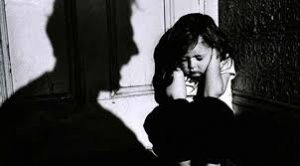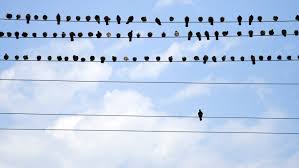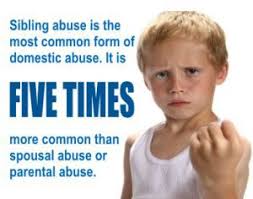
If you are a child of narcissistic parents growing up was never loving, supportive, fun, relaxing or safe. Since narcissists are completely self-obsessed they have absolutely no problem destroying the lives of their children emotionally and socially, they simply use them for their own entertainment or because doing things for their children such as driving them to sports practice or taking them on outings is just too much trouble. After all what is in it for them? They can control their children more easily if they refuse to accommodate their needs and desires in any way so the answer is always “no”, and after a while the children don’t even bother asking. If you are born into a family like this the abuse doesn’t stop in adulthood, if anything the disorder of the parent(s) becomes more pronounced in old age.
Many adults are afraid of and avoid their feelings and the feelings of others because they were not validated as a child. Either they were completely ignored, so expressions of fear, insecurity or sadness were not acknowledged, comforted and could have been punished. Even expressions of happiness, joy and excitement can also cause irritation/rage in a narcissist parent. Because these children were not “allowed” to express their own feelings, they have no idea how to process them or recognise them in others.
A narcissist parent will also invalidate/devalue a child if s/he goes to them with the desire to express a feeling or emotion. This sort of rejection of a child’s emotion may be done by telling the child five reasons why they should not feel a certain way, or tell the child that they misinterpreted the situation – even if the parent wasn’t there. So they might say “I am sure that they didn’t mean it like that” (how can they be sureif they were not present), or they might just be too busy to listen to the little problems that their child has and say something like “not now”, to a child “not now” means “not ever, when a child is rejected like this it is deeply hurtful and so it is highly unlikely that they will return and risk getting rejected again. We all hate rejection but it is very traumatic for a child, especially from their primary carer. When a child is rejected over small problems, they will learn that it is not safe to go to their primary carer with larger problems, which to a child feels like abandonment.
The effect of this invalidation or denial of a child’s feelings will carry through into adulthood. The adult child will feel that they are not entitled to own their own emotions as in the past they risked upsetting one or both of their parents and the adult child will certainly be self-doubting and very unsure of their own feelings. This will mean that the child will not develop a healthy model of love as the “love” they experienced as a child will have been conditional on pleasing their parent(s). Frequently the children of narcissist parents do not have more than the most basic emotional vocabulary to express themselves as they will have received a very limited scope of emotions from their own parent(s) and so they perpetuate the cycle of emotional neglect/abuse.
The child will get into the habit of hiding their feelings both from others and from themselves, since it is less painful for the child to hide their feelings (numb out/disconnect or detach from themselves) rather than to feel and be either denied or punished for what they feel.
A thing that a lot of children of narcissistic parents don’t realise is that NO ONE HAS THE RIGHT TO TELL YOU WHAT YOU CAN OR CANNOT FEEL, it is a total violation of boundaries and a sign of a very unhealthy relationship, for the simple reason that the parent is not relating or accepting the feelings of their child in any way.
A narcissistic parent might get annoyed with a child for feeling sad, worried or insecure, because s/he is anxious not to be portrayed as anything other than a perfect parent and having to deal with the emotions of a child are a burden and it means they are not playing out the assigned role given to them, which more often than not is take care of the parents needs and suppress their own.
The aim of the narcissistic parent is to beat the child (either emotionally or physically) into a state of total submission at which stage the parent will replace the child’s feelings with their own needs and thoughts. The child of the narcissistic parent will not be given any option other to comply because the alternative will manifest itself in the form of threats of abandonment, ridicule (your emotions are not good enough), sneering (your emotions are not valid), some sort of humiliation, physical punishment or a passive aggressive reaction.
Another aim of the narcissistic parent is to rob the child’s sense of personal identity or of being an individual that can operate independently within the family structure. This gives a very clear message to the child, which is to say “you are only lovable if you comply with my needs and wants” (my love for you is conditional on how well you perform in accordance with my needs and wants, if you do not comply you will be punished or ignored). This type punishment will start from a very young age, usually when the infant begins to walk and explore the world on their own and test some boundaries. A very young baby is bound to their mother for their comfort and survival. A baby placed on the hip of the narcissistic mother is perfect, she will see it as a symbol of her perfect mothering skills, a demonstration of how involved she is with her young. It will pose no threat to her superiority or control, the life of the child depends on her exclusively as the baby knows instinctively. It is only when that child tries to self-express and become an individual that the problems arise, these problems will grow in intensity as the child gets older and tries to break free of the suffocating restrictions of their family of origin.
Children of narcissistic parents will therefore have a tendency to climb up into their head space as it is safer there. The parent cannot attack “thoughts” and the child will have put the mute button on them and will try to work things out logically, rationally and silently instead. However, unexpressed feelings have a way of oozing out in some other form, it might be a mutation of the original emotion and therefore are difficult for the child to own. Especially later on in life when they emerge as emotional flash backs, the distorted emotions are evoked but not identified.
If you ask a child of a narcissistic parent how they feel about something they will probably say “I think” rather than “I feel”. Others might say “you feel frustrated when they do that” rather than “I feel”, which is indicative of detachment from their own feelings.
There are also physical signs of the emotional neglect of narcissistic parents such as children/adults self-caressing to comfort themselves in moments of stress since they were denied the security of a loving parent. The child of a narcissistic parent will find it hard to self-soothe or form strong attachments to others. Or conversely they might form very speedy and inappropriate attachments to relative strangers as a plan B in case their parents followed through on their perpetual threat of abandonment. This leaves the adult child of a narcissist wide open to further abuse of the predatorial type.
Parents are supposed to teach love, self-love, self-acceptance and compassion. This cannot happen if the parents do not provide a role model for their children. This model is parent to child as well has adult to adult. Children mimic their parent’s behaviour, much more than they listen to their words.
Children of narcissistic parents have a particularly difficult time because they will have to have lived with parents who were constantly in competition with them, and as a result, the parent being the more powerful in the relationship, constantly used that power dynamic to bolster themselves at the cost of their child’s confidence and self-esteem. From childhood the narcissistic parent was cold, indifferent, secretive, extremely critical and categorically refused to acknowledge any achievement that their child made. Narcissistic parents deeply resent any demands on them made by their children and would easily punish them if they did so. Narcissists live for themselves and do not care about the emotional well-being of their child, they will only take care of the physical well-being if they think that it is on “display” (public image). The unloved children of a narcissistic will be much more vulnerable to getting into future relationships with narcissists both as partners and friends because the narcissist will instinctively know that the child of a narcissist is very open to being manipulated/bullied and narcissists look for people like that because they are much easier to control and therefore less “work”.
Narcissists see their children as a means provide emotional security for themselves and the role allocated to them is not to make demands, for those demands will be denied, when the demands are denied the narcissistic parent will make it very clear that the “fault” lies with the child. Those demands could be anything from wanting to go to play in a football match to being physically sick. The children of narcissist parents are often so traumatised that they will vomit from anxiety, this level of anxiety creates the fight or flight response from the abuse of the parent, but in this case the child has nowhere to go and vomiting is the release that the mind/body reaction of the child will come up with. This can evoke several reactions from the parent, such as to laugh at the child for being silly, to get angry with the child for “making her feel she should do something”, or getting angry with the child for making a show of themselves (and therefore the parent).
A narcissistic parent will for example test two children to see what their children can do for them, once the roles have been allocated s/he will be determined to force them to keep playing that role, until s/he deems fit to make a change. That role could be “mummy’s baby boy”, so it is not uncommon to see a 17-year old son of a narcissist to sit on “mummy’s knee”. This type of infantilising is designed to keep children orbiting around their parents so that the parents can maintain control. Paradoxically, this infantilized child can also be given the role of “mummy’s little man” or “Mummy’s best friend”, in this projected role the child is supposed to take care of the emotional needs of their mother (and sometimes some of the physical ones too), this is very inappropriate behaviour and is a form of child abuse.
All types of abuse come from fear, fear of being physically or emotionally hurt. Narcissistic parents will continuously drop subtle and not so subtle hints of what might happen if there is any subordination, constantly preying of fear to keep their children “in their place”. Narcissist create instability, unpredictability, and behave irrationally but rarely use traceable abuse. They break your trust with yourself by telling you who you are, what is what, how things should be and denying anything that does not fit their narrative of the day. This creates doubts about family and friends, the stability and the benevolence of others. The narcissist will understand that the trust of a child is something that they can take for granted since society tells us that our parents love us, this creates cognitive dissonance in the child, but usually the child will opt to follow the cultural norm because no one wants to believe that our primary carers don’t care, and in some cases hate their children. So the child tries harder to please as it is too painful to admit to the reality and they will be more willing to follow the cultural myth (all parents love and want what is best for their children) and so they shut down and make excuses for behaviour that provide evidence to the contrary. It is very likely that you will need an awful lot of evidence before you are willing to accept that your parents do not have your best interests at heart and are completely indifferent to your needs.
A narcissistic parent will not connect with their child(ren), but will constantly act as an observer. So, a parent will ask about one of their off spring about another, and will say something like “how is your sister” (even though they are all living in the same house), they will not go directly to daughter and ask “how are you?”. They do this because they don’t want any emotional reaction from their child, they are just harvesting information to manipulate their child. This approach further distorts the already dysfunctional family unit because the sister does not get to say what she wants to say or not want to say to the narcissist parent, but her sibling gets an opportunity to put a “spin” on what is said as it might work to his or her benefit or they might not know, but will make something up to satisfy the parent. (Narcissistic parents although extremely secretive themselves, can get very aggressive if they think that information is being withheld).
An infant born into narcissistic family dynamic will receive absolutely no empathy from their parents. What is even more upsetting for the child is that they will more than likely be punished for being emotional or sensitive in response to the abuse and trauma that they are subjected to. The result of which that in the first five years of the child’s life they will have been given an extremely toxic self-image by their parents. The toxic parents will have selected their most sensitive child at a very early stage in their life to be the scapegoat and by the time that child is a toddler it will be made the target for all of the family woes.
The scapegoat child is very often labelled as the black sheep of the family. This term is often used by parents to suggest that the child is “difficult” this however is a euphemism for the child refusing to conform to or normalise the emotional abuse. The child’s needs and emotions will be ignored on purpose to shame, diminish and to break the spirit of the child, so that they eventually are too scared to ask for help in any shape or form at all. All of the children of narcissists will be expected to put the needs of their parents first and are expected to worship them too (there will be no evidence that the parent is worthy of worship, but it is a refrain that will be repeated time and time again – eventually brainwashing the child into thinking that it is true). The scapegoat child is expected to put on a veneer of normality and inclusion within the family to the outside world, which is of course absolutely false as the scapegoat child will never be let feel that they belong. The narcissistic parents will cast the other toxic siblings in the role of supporting the position of the scapegoating the child who they perceive to be their most “difficult/unworthy” child. Also perceived as the most threatening to them.
If any sibling (even a golden child) dares to support the scapegoated child, they put their own position with in the family system at risk if the toxic parent notices what they are doing. Most toxic sibling rivalry is created by toxic parents, they do this by having obvious favourites, talking ill of each child behind their back, attributing vicious comments they made – to siblings, encouraging bullying and physical and emotional abuse between siblings, this is all done as a complex web of sabotage of their own children to garner control and to be at the centre of attention in the family where all of the children are constantly on high alert and looking at their parents for cues for when the next bit of abuse is coming. For the most part siblings of narcissistic families do not realise that they have been manipulated in this way and will continue in their roles into adulthood.
Children born into narcissistic families tend to have several personality types. The rebelwho tries to seek justice and stop the abuse whenever they can and points out the injustices and manipulation (this level of indignation about injustice can be quite immature, some young children feel the intensity of injustice, it is really important to them, it is before they realise that “life isn’t fair” and it makes them feel really indignant – most bedtime stories let them down). It is for this reason they are made to be the scapegoat because narcissists are never wrong so the child that points out wrong doing will automatically be punished. That child can expect to be bullied all through their life by family members and will often be cut out of wills after dedicating their lives trying to take care of the impossible emotional needs of the parents and trying to show them right from wrong and how to be kinder and more loving. The narcissist might well mimic the behaviour of this child taking credit for their acts of kindness but it is an act and there is nothing authentic about it. There will be a lot of envy on behalf of the parent(s) of this child because they will see how non family members relate to him/her and they will punish them for being more popular than them (everything is a game with narcissists and they always have to win).
The lost child knows that there is something inherently wrong with the family dynamic but is not sure what it is. They avoid confrontation at all costs and try to win the favour of their narcissistic parents. So they ignore the abuse of the scapegoat and will very often join in as it will please the parent(s), these children have little or no empathy and are devoid of authentic emotion. They frequently have very stiff posture and find future relationships hard to manage.
The golden childhas an extreme sense of entitlement and is motivated by greed. They will sell their souls to get what they want, because they twist and contort themselves to facilitate the parent(s) by doing or saying whatever it takes to make sure that they remain the favourite. They might well be very disrespectful of their parent(s) behind their back but will be as sweet as honey and stroke the ego of their parent(s) to their face. These children take no responsibility for what they say or do and that could be absolutely anything if it means that they are seen in a favourable light. They have learnt how to work the narcissistic system and are at once extremely secretive and opinionated at the same time. The golden child will often exhibit characteristics of or be a full blown narcissist themselves.
If you have grown up in a narcissistic family you will have probably encountered the most sadistic, cruel and abusive people that you will ever meet. It is extremely alarming when you realise that characteristics such as sadism and cruelty exist in your own family of origin and are not something that “other people” whether it be in history or far off lands experience. If you go no contact with your narcissistic parent(s) (especially if you are the scapegoat) you can be confident that they will go on a smear campaign and will send the flying monkeys after you to try to hoover you back in so that they can continue to get pleasure from bullying you. They will also let you know that you will never really “belong” to the narcissist’s family you will only be welcome in your role as scapegoat.
A narcissistic parent will not support their child in anything that they do. If they have a fight at school with another child, they will support the other child. If their child is being bullied, they will maintain that they must have done something to deserve it. If their child is sick they will tell them it is psychosomatic or will just ignore the fact that they are unwell (including broken bones and high temperatures). Later on in life if the child divorces they will either take the side of the ex-spouse, or sneer at you for getting it wrong saying “I told you so” even if they acted like they adored the spouse. They refuse to support their own children because they think that it makes them look “better than” and gets them more attention if they openly support the others. Since they feel like they own their children, it really doesn’t matter to them what the negative impact will be on their children.
So how does all of this behaviour effect the child(ren)?
- The child will feel devalued
- Unloved
- Their reality will never be validated
- They will feel that their feelings are a burden on the parent and therefore unacceptable
- The “love” of their parent(s) will be based on how well they perform for that parent in terms of taking care of their needs and image.
- The child will grow up not knowing how they feel about anything because their feelings/emotions will have always been denied
- The child will have low self-esteem and crippling self-doubt
- They will have no healthy love model to follow and love will feel like a sentence of confinement rather than something positive and nurturing
- They will have been taught that it is not okay to express themselves at the risk of out shining their parent, so they will try to keep their head down and not draw attention
- Social anxiety will be fostered so that the narcissistic parent can maintain control of their child
- The child will look outside themselves for external validation
- The child will grow up feeling “not good enough”, “I can’t do that, I will make a fool of myself for trying”
- The child will let themselves be chosen by future partners/friend (predators) because they are not worthy of joining in an equal relationship
- They will take care of others to the detriment of their own self care






